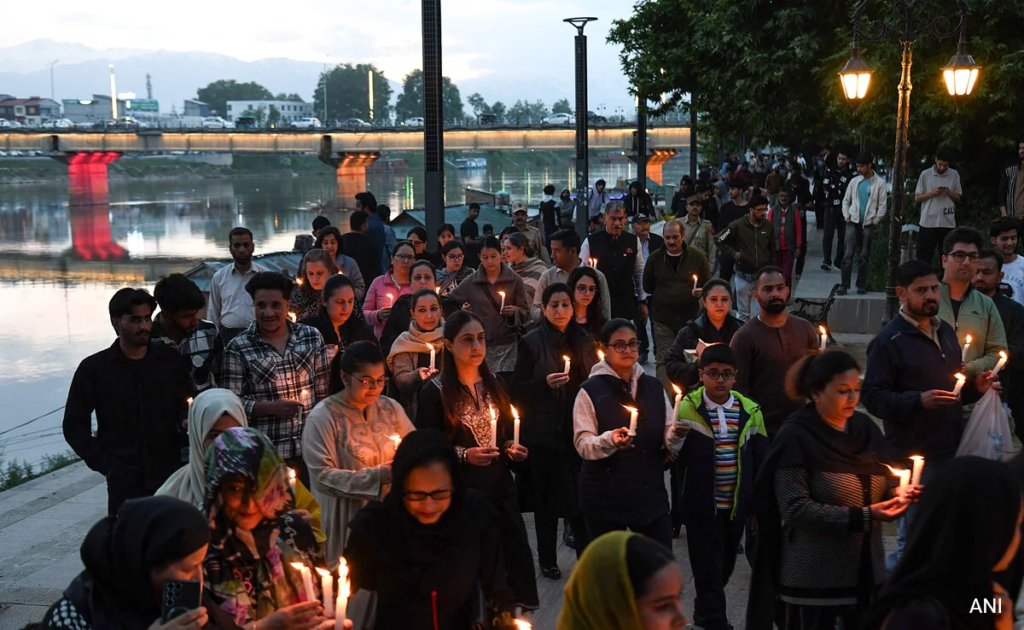Jhelum Water Release Triggers Panic in Pakistan
A sudden surge in the Jhelum River’s water levels has caused widespread panic in Pakistan-occupied Kashmir (PoK). Local authorities blame India for releasing water from the Uri Dam without prior warning.

The sharp rise in water levels triggered a water emergency across several areas, forcing residents to flee and raising fears of major flooding.
What Happened?
On Saturday, April 26, 2025, water levels in the Jhelum River rose sharply in PoK, especially around Muzaffarabad, Hattian Bala, Chakothi, and Ghari Dupatta.
The sudden spike led local authorities to issue flood alerts and urge residents near the riverbanks to evacuate. Announcements through mosques and blaring sirens warned people to stay away from the river and avoid fishing or grazing livestock.

Many residents scrambled to protect their homes and belongings as panic spread.
Reports suggest that the water release came from the Uri Dam, located in Indian-administered Jammu and Kashmir. Pakistani officials claim India gave no prior notice, which they say violates the Indus Waters Treaty (IWT) — a 1960 agreement that governs water-sharing between the two countries.
Where Did This Happen?
Several areas along the Jhelum River in PoK were affected, including:
- Muzaffarabad, the capital of PoK, where residents gathered on bridges to watch the raging river.
- Hattian Bala, about 40 km from Muzaffarabad, where authorities declared a water emergency.
- Chakothi, Ghari Dupatta, and Majhoi, where flood warnings were issued, and residents were asked to relocate.
The Jhelum River originates in Indian-administered Kashmir, flows through PoK, and then continues into Pakistan’s Punjab province.
Why Did This Happen?
The water release follows heightened tensions between India and Pakistan after a terror attack in Pahalgam, Jammu and Kashmir, on April 22, 2025. The attack killed 26 tourists.

India blames Pakistan for supporting the attackers, a claim Pakistan strongly denies. In response, India suspended the Indus Waters Treaty on April 23, marking a major escalation in diplomatic and resource disputes.
Pakistani officials and local residents allege that India deliberately released water from the Uri Dam to pressure Pakistan. However, some Indian media outlets report that the release was part of a routine operation following heavy rainfall in Jammu and Kashmir. Indian authorities have neither confirmed nor denied these claims.
The suspension of the Indus Waters Treaty has raised fears of a growing water crisis in Pakistan, which relies heavily on rivers like the Jhelum, Indus, and Chenab for farming and drinking water. India’s decision to stop sharing hydrological data and flood warnings has further strained ties.
Who Gave the Order?
No specific Indian official has been named as responsible for the water release.
Indian authorities have not publicly acknowledged the action, leaving it unclear whether the release was intentional or simply part of regular dam management. The lack of information has fueled speculation and accusations from the Pakistani side.
Pakistan Officials’ Reactions
Pakistani officials have strongly condemned the water release. They call it a violation of international norms and the Indus Waters Treaty.
Local authorities argue that the unannounced discharge endangered lives and property in PoK. A spokesperson for Muzaffarabad’s district administration stated, “Due to India releasing more water than usual into the Jhelum River, there is moderate flooding.”
Officials criticized India’s failure to provide advance notice, saying it could have allowed better preparation for the emergency.
Prime Minister Shehbaz Sharif has called for a “neutral investigation” into the Pahalgam attack and denied any Pakistani involvement. Meanwhile, Defense Minister Khawaja Muhammad Asif warned that any move to stop or divert water flows to Pakistan would be seen as an “act of war.”
Pakistani authorities have also voiced fears that India’s treaty suspension could severely impact Pakistan’s agriculture. About 80% of the country’s farms depend on rivers governed by the treaty.
Rising Tensions
The Jhelum water release has worsened already high tensions. India and Pakistan have exchanged gunfire across the Line of Control (LoC) in recent days, while diplomatic ties are at their lowest in years.
The United States and the United Kingdom have issued travel advisories, warning citizens to avoid border areas because of the rising risk of conflict.
J
\


![An ambulance is parked at the site of the Lapu Lapu event in Vancouver [Jennifer Gauthier/Reuters]](https://worldinfo.news/wp-content/uploads/2025/04/Car-Crashes-into-Vancouver-Festival-Kills-Several-554x346.webp) Car Crashes into Vancouver Festival Kills Several
Car Crashes into Vancouver Festival Kills Several  Trump Meets Zelensky, Questions Putin’s Peace Intentions
Trump Meets Zelensky, Questions Putin’s Peace Intentions  Kashmir Tensions Rise After Attack and Border Clashes
Kashmir Tensions Rise After Attack and Border Clashes  Barcelona Clinches Copa del Rey Over Real Madrid
Barcelona Clinches Copa del Rey Over Real Madrid  Pakistan Admits ‘Dirty Work’ for U.S., Sparks Global Outrage
Pakistan Admits ‘Dirty Work’ for U.S., Sparks Global Outrage  UK Social Media Giants Face £60000 Fines
UK Social Media Giants Face £60000 Fines